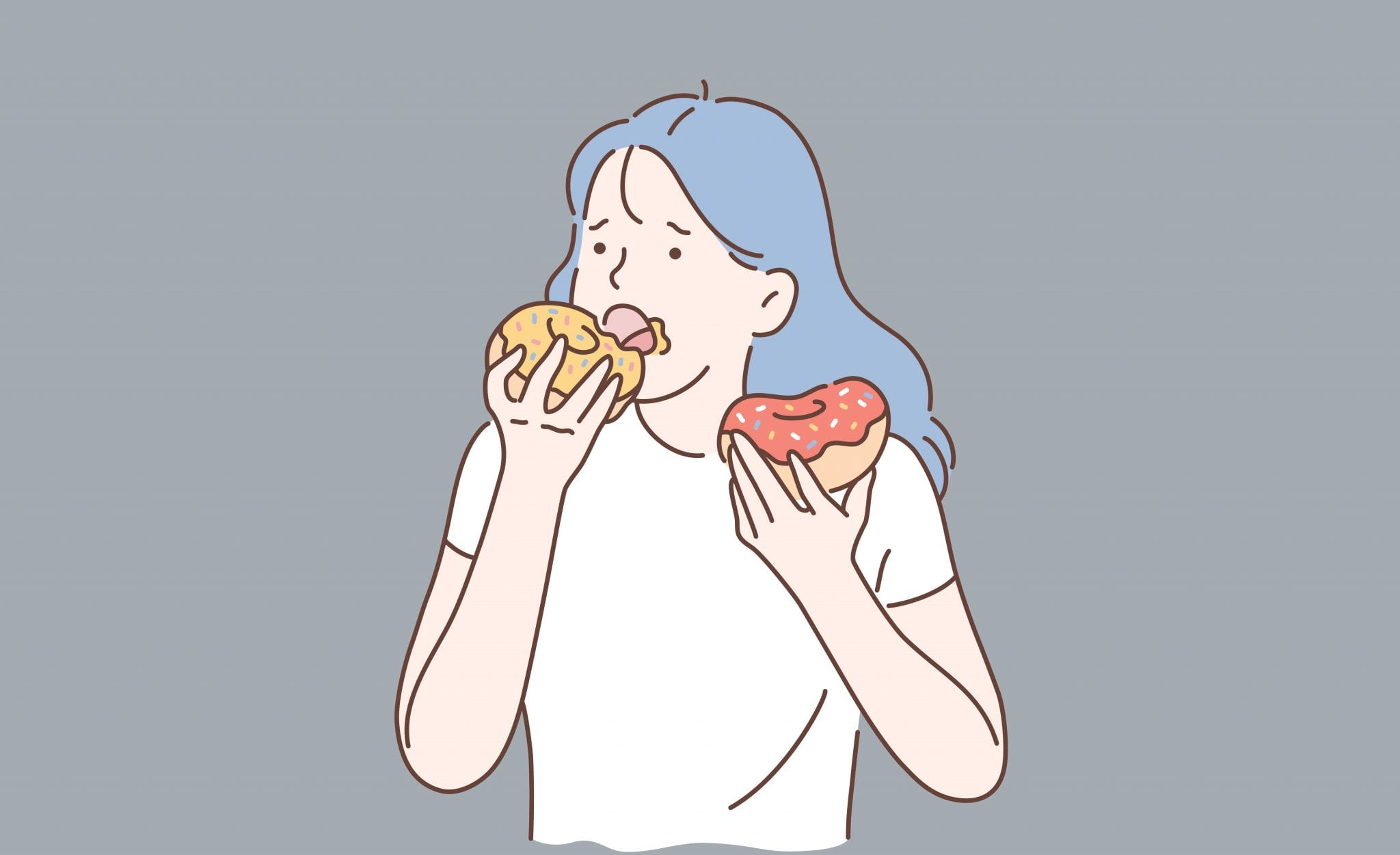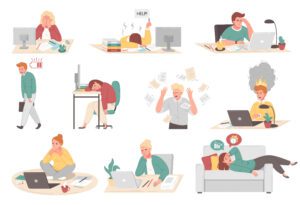The Link Between Anxiety and Overeating
This article has been researched and written by Nayla Daou. AI has not been used in producing this article.
All of us have encountered moments of stress and unease throughout our lives. These feelings of anxiety not only bring about concerns and apprehension but also trigger tangible reactions within our bodies. Naturally, we tend to steer clear of these emotions by engaging in alternative actions like excessive eating. And while it’s true that certain foods can help to reduce anxiety, for people who struggle with overeating, food can become a negative coping mechanism to deal with anxiety.
The impact of stress on appetite
In the short term, stress can decrease appetite. When our body experiences stress, the hypothalamus releases corticotropin-releasing hormone, which suppresses appetite. During periods of anxiety, the brain also sends messages to the adrenal glands which signals the kidneys to create the hormone epinephrine (also known as adrenaline). Epinephrine also helps to temporarily curb one’s appetite.
However, when stress becomes persistent, the adrenal glands release another hormone called cortisol. Commonly called the “stress hormone,” cortisol causes an increase in your heart rate and blood pressure. Food can provide our body with the same type of reward and reaction that cortisol does. Cortisol increases appetite and can ramp up motivation in general, including the motivation to eat. Once a stressful episode is over, cortisol levels should fall, but when the anxiety doesn’t go away, cortisol may stay elevated.

Eating as a coping mechanism
When we become worried, anxious, or stressed out, we can turn to overeating to manage our anxiety without even realizing it. Whether we’re feeling bored, lonely, depressed, or anxious, eating can help to quell our emotions. However, stress eating is hard to stop and hard to control. When left unmanaged it can lead to overeating or binge eating. While this may not make sense on a rational level, binge eating can ease the symptoms and feelings of anxiety. Binge eating involves frequently consuming unusually large amounts of food in one sitting.
One of the most current and well-researched ways of understanding the overlap between anxiety and overeating is through a concept known as Experiential Avoidance. Experiential Avoidance occurs when we don’t want to be aware of or “in touch” with our internal emotions (feelings, thoughts, or sensations). To avoid these internal emotions we take steps to reject, disconnect, deny or avoid those experiences. However, whether we use food or another coping mechanism to try to calm anxious feelings it typically has a negative physical and emotional impact on our physical or emotional health. In relation to using food to deal with anxiety, the desired effect is to suppress, distract, numb, avoid, soothe, or hide the original feelings of anxiety.
Stress and sugar
Stress and anxiety impact food preferences. According to Harvard Health, numerous studies indicate that “physical or emotional distress increases the intake of food high in fat, sugar, or both.” Once ingested, sugar-filled foods tend to inhibit activity in the parts of the brain that produce and process stress and related emotions. So part of our stress-induced cravings for sugary foods have been linked to emotional eating and overeating.

Tips to avoid using food to suppress anxiety
Using food to manage stress, rather than for hunger, is not a healthy long term solution. There are many approaches to lessening the intensity of anxiety, including:
- Psychotherapy with a licensed mental health provider can help to determine the root causes of anxiety and to develop positive coping mechanisms to manage the symptoms associated with anxiety.
- Meditation or mindfulness can help reduce emotional eating for individuals with persistently high stress levels.
- Exercise can reduce cortisol levels. According to research conducted by the University of California, vigorous exercise may have a negative impact on stress levels. However, less intense levels of exercise, such yoga and tai chi, have elements of both exercise and meditation and can help reduce stress levels.
ClearMinds
At ClearMinds Center for Emotional Health, we create custom-tailored treatment plans to help our clients identify, mitigate, and manage anxiety. If you or a loved one are battling with anxiety, or find yourself overeating to cope with stress, we can help.
Contact a member of our team to schedule your appointment today.
How Psychoeducational Assessments Help Shape Better Learning Plans in School
No two children are the same. Every child brings a unique mix of strengths, challenges, and ways of …
Can Relationship Counseling Work for Toxic Relationships?
Relationships can be complicated, emotional, and at times, painful. While every couple experiences ups and downs, some relationships …
10 Signs You May Have Anxiety
Anxiety is a normal and natural human response to stress, danger, or uncertainty. However, when anxiety becomes excessive, it can …
Child Sleepwalking and Talking: What You Need to Know
Childhood is a time of rapid development, filled with new experiences—and sometimes, surprising nighttime behaviors.
Questions a Child Psychologist Might Ask
When preparing for your child’s first appointment with a psychologist, it’s natural to feel curious—or even a little anxious—about what …
55 Love Questions for Couples to Deepen Your Relationship
In any relationship, communication is key. Whether you’re just starting out or have been together for years, asking meaningful
Stress vs. Anxiety vs. Burnout: How to Recognize the Difference
In today’s fast-paced world, understanding the differences between stress, anxiety, and burnout is crucial for …
Relocation Depression: Definition and Ways to Cope
Relocation depression, also known as moving depression, is a form of situational depression that arises from the stress …
How to Help Your Child with Anxiety Through Divorce
Divorce is a significant change that affects every member of a family. For children, the uncertainty and adjustments …
Depression vs Sadness: Understanding the Difference
While often used interchangeably, the terms “sadness” and “depression” represent distinct emotional states, each with …











